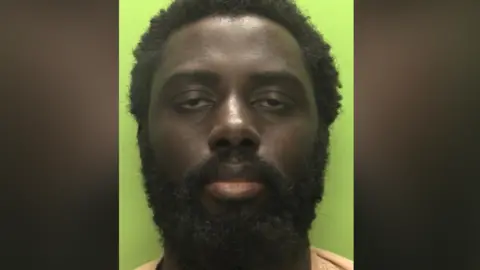Nottingham attacks: Triple killer's sentence considered for review
The attorney general is considering whether judges should review the sentence of killer Valdo Calocane.
Calocane, 32, killed Barnaby Webber, Grace O'Malley-Kumar and Ian Coates in Nottingham last June.
The attorney general's office has received a referral arguing the sentence was too lenient, after he was found guilty of manslaughter and given an indefinite hospital order.
NHS England will also investigate his contact with mental health services.
During the sentencing at Nottingham Crown Court on Thursday, Mr Justice Turner said Calocane would "very probably" be detained in a high-security hospital for the rest of his life, after he admitted manslaughter on the grounds of diminished responsibility.
The families of those who died have expressed anger that Calocane was given a hospital order, with Mr Webber's mother saying "true justice has not been served".
She said the Crown Prosecution Service had, in November, presented her family with a "fait accompli that the decision had been made to accept manslaughter charges".
"At no point during the previous five and a half months were we given any indication that this could conclude in anything other than murder," she said.
Janine McKinney, from the CPS, said the manslaughter plea was accepted on the basis of "overwhelming" expert medical evidence, "namely that his actions were substantially impaired by psychosis resulting from paranoid schizophrenia".
It said that after three psychiatrists "agreed that a partial defence to murder on the grounds of diminished responsibility" was available to Calocane, it took the "unusual step" of commissioning a fourth psychiatric expert to review the evidence, who also agreed.
"On the basis of this evidence, the CPS concluded that there was no realistic prospect of conviction for murder, so accepted the pleas," it said.
In his sentencing remarks, Mr Justice Turner said one of the psychiatrists reviewing the evidence had said that Calocane's mental illness "will never be 'cured'".
Given that Calocane's schizophrenia was resistant to treatment Mr Justice Turner said it was "very likely" that he would never be released.
Labour leader Sir Keir Starmer, former head of the Crown Prosecution Service, backed calls for an inquiry into any failings that led to the attacks.
He said he was "very worried by what appear to be a number of points at which action could have been taken that would have prevented this happening".
His comments came after Prime Minister Rishi Sunak declined to back calls for a public inquiry, but promised to learn "any lessons" from the case.
Sir Robert Buckland, a former justice secretary, said better communication was needed with the victims' families, who said they were first made aware of a limited defence of diminished responsibility when a hearing took place in November.
Sir Robert said the prosecution had commissioned their own report before then, and described the lack of communication with the family as "a matter of concern".
"I think that everybody should be asking themselves whether or not the family should have been told earlier," he told BBC Radio 4's Today programme.

After the sentencing, a spokesman for Attorney General Victoria Prentis confirmed her office had received a referral arguing the sentence administered had been unduly lenient.
Law officers now have 28 days to carry out a review and weigh up whether to refer the case to the Court of Appeal to decide whether the sentence was appropriate.
Under the Unduly Lenient Sentence Scheme, anyone can ask for a crown court sentence to be reviewed if they think it is too short.
During the trial, the court heard Calocane had been diagnosed with paranoid schizophrenia. The Independent Mental Health Homicide Review will examine what lessons can be learned.
Among the questions the investigation is likely to examine is whether the killings could have been predicted or prevented.
At Calocane's sentencing hearing, it was revealed the former University of Nottingham student believed MI6 was spying on him.
He had been detained under the Mental Health Act at a psychiatric unit in Nottingham four times since May 2020 - the final time he was discharged was in February 2022, more than a year before the killings.
He was prescribed anti-psychotic medication but stopped taking it, which the prosecution said led to a further decline in his mental health.
Nottinghamshire Healthcare NHS Foundation Trust, which runs mental health services in the county, said in a statement it had "robustly" reviewed its interactions with Calocane.
Chief executive Ifti Majid said "there are many people who live with severe mental illness issues who do not offend and are supported to live well in the community".
"If a patient no longer engages with our services and support and they do not meet criteria to be detained under the Mental Health Act, they are discharged back to the care of their GP and can be referred back into our services at any time," he said.
 Nottinghamshire Police
Nottinghamshire PoliceSpeaking outside the court Emma Webber, mother of Mr Webber, was critical of the Crown Prosecution Service's decision to downgrade the charge from murder.
She also accused Nottinghamshire Police's Assistant Chief Constable Rob Griffin of having "blood on his hands", following the force's failure to detain Calocane after an arrest warrant was issued in September 2022, over an assault on an officer. Nottinghamshire Police's Assistant Chief Constable Rob Griffin said police "should have done more to arrest him", but that he felt it unlikely Calocane would have received a prison sentence.
"Of course, an arrest might have triggered a route back into mental health services, but as we have seen from his previous encounters with those services, it seems unlikely that he would have engaged in this process," he said.
